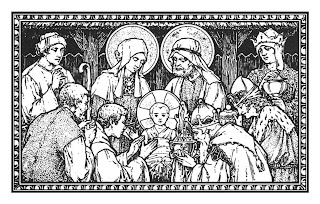 | Scripture In Depth Reading I: Malachi 3:19-20a Responsorial Psalm: 98:5-6, 7-8, 9 Reading II: 2 Thessalonians 3:7-12 Gospel: Luke 21:5-19 |
|
| Reading I: Malachi 3:19-20a This reading has a timeless quality about it—the warning that the day of the Lord is coming and that it will spell doom for all the arrogant and evildoers. But for those who fear the name of God, that day will mean vindication and salvation, beautifully described as the rising of the sun of righteousness with healing in its wings. In his well-known Christmas hymn, Hark the Herald Angels Sing, Charles Wesley applied these words to the birth of Christ: Risen with healing in his wings Thus interpreted, this reading strikes two notes. (1) One is the last judgment, which will be dominant on the next two Sundays, and (2) the other is the coming of Christ in his nativity, which will be developed on the latter Sundays of Advent. The end of the old Church year dovetails with the beginning of the new. In the perspective of Malachi, however, the positive part (the rising of the sun with healing in its wings) refers to the last judgment just as much as does the negative part (the warning to the arrogant and evildoers). |
| Responsorial Psalm: 98:5-6, 7-8, 9 This is another of the enthronement psalms*1, which celebrate the kingship of YHWH. It has already been used earlier in this Church year. The enthronement psalms are full of exuberant joy at the saving power of YHWH. The refrain of our Responsorial Psalm is: "The Lord comes to rule the earth with justice." The “nations” will see God's saving power and the nations actually participate in salvation. |
| Reading II: 2 Thessalonians 3:7-12 There were members in the church at Thessalonica who (perhaps misled by some early gnosticizing movement) believed that the day of the Lord had already come. Since they thought that they were in heaven already, the curse of having to work (Genesis 3) had been removed. They could therefore eat, drink, and be merry. |
| Gospel: Luke 21:5-19 *2 First we must remember that the literary style of apocalyptic is a peculiar one. The authors do not conceive themselves to be predicting, in an abstract, uninvolved way, the “last things” that are to happen centuries later; they are often interpreting (a) present crisis. The predictions of persecutions are genuine warnings of Jesus, addressed to his disciples (vv. 12a, 16-19) but elaborated in the light of what actually happened to Peter, Paul, James the Just, and others during that decade (v. 12b). The promise of divine assistance to the disciples in the time of trial reflects an original promise of Jesus of the gift of the Holy Spirit. The signs of the end times that Jesus names (wars, insurrection, earthquakes, famine, plagues, etc.) describe human history as it has always been. The challenge for us as faithful followers is to face persecution with courage now, testify to Jesus’ name now, open ourselves now to the wisdom given us by Jesus. Embracing this way of living gives us hope and confidence that, no matter when end times come, our lives are secure. The end times, no matter when they come, do help us reflect on how we need to live now. |
*1 - The magnificent enthronement psalms (Psalms 93, 96-100) visibly express (according to scholarly theory) in the enthronement of the king at the new-year festival.
*2 MUCH more detail in the original essay!
SOURCES:
1) Working With the Word, by Joyce Ann Zimmerman, CPPS; Kathleen Harmon, SNDdeN;
and Christopher W. Conlon, SM
2) Scripture in Depth, by Reginald H. Fuller



No comments:
Post a Comment